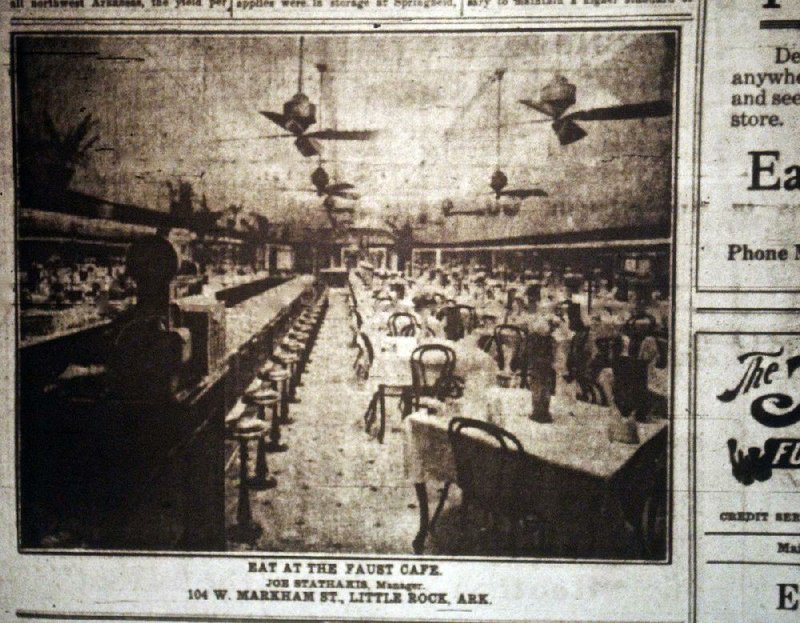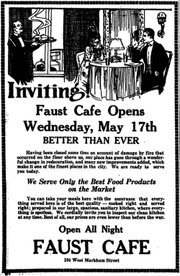A character from Labor Day 1917 has so enchanted Old News that we are talking about him again today. In fact, today is Part 3 of a five-part ... fascination? obsession? ... with tracks left in old newspapers by the late Joe Stathakis, entrepreneurial Greek immigrant.
He had several Little Rock restaurants, but the jewel was Faust Cafe at 104 W. Markham St., which at its peak served 1,000 meals a day -- according to Joe.
He and his brother, Sam, leased the space in 1912. That August, the Arkansas Gazette reported that Joe had just returned from a visit to New York, Philadelphia, Cincinnati, St. Louis and other points:
The former Falstaff Cafe ... is being remodeled for the Faust Cafe, and while away Mr. Stathakis visited the principal cafes, not only to get ideas of internal decoration, but as to the latest up-to-date methods of service.
An ad for a grand opening Sept. 14, 1912, described a new place "in the heart of the business district, and right among the European plan hotels" that was "without a doubt" one of the most modern restaurants in the South.
There will be private tables for ladies who desire exclusive service.
Meanwhile, King George I of Greece had summoned emigres home to fight the Ottoman Empire -- in what is now called the first Balkan War. Greek men left Arkansas in waves.
On Oct. 29, 1912, Joe and other leaders of the ethnic Homer Society (Charles Kumpuris, Harry Pappas, Gus Kostakis) saddled up to escort the second wave -- 26 young men -- to the train station. On horseback beside mounted city police, they led a regimental band and standard bearers with the flags of Greece and the United States side by side. About 100 Greeks with miniature flags and torch lights followed.
Joe Stathakis, one of the Greek leaders, said last night that the Turks have committed many atrocities within recent years that the Greeks have borne with patience. On the borders they have burned churches and schools, attacked women and children, committed depredations and sought in every way to hinder the Greek observances of a Christian religion.
The Gazette interviewed Joe again in November, after King George called all former soldiers -- older men -- back to defend the islands.
Mr. Stathakis, when asked if the call would meet with a ready response by American Greeks, said, "I do not know about that. However, if they have any desire to ever visit their native land in time of peace they will have to go now, or be barred for all time. It is a part of the Greek constitution, that they must answer the summons when needed, and if they fail, they will be imprisoned from two to five years if they ever go back. ...
"I do not know of any ex-Greek soldiers in Little Rock now."
In December, Greeks in Little Rock contributed heavily to the Red Cross. "Owing to his many business affairs," Joe resigned as president of the Homer Society, and he shared postcards from friends at Athens who expected to get uniforms soon.
In January 1913, the Gazette reported that a Faust waiter named George Kostas was off to fight in Greece. He said (oddly enough) his boss had delayed him for a while, telling him the war was almost over. But then his father wrote him a chastising note.
In March, the Arkansas Democrat reported Joe's reaction to the assassination of the Greek king:
Mr. Stathakis says he remembers King George, having seen him often walking along the streets of Athens unattended. Mr. Stathakis recalled an incident wherein King George once went among some Greek soldiers and began to denounce himself, whereupon one of them slapped his face and drew a sword. The king then disclosed his identity. The soldier was horror-stricken but the king promoted him.
May 1913: Frank Dumas writes from Athens to let Joe know he's coming back to his job as a waiter at the Faust. "It's fine to be back in the old country for a while," Joe reads, "but there is no place like Arkansas."
March 1914: The Faust installs a music box described as a "combination self-playing violin and piano."
August 1914: A new electric sign appears above the entrance of the Faust Cafe. "The sign has no lettering whatever, but is a facsimile of the original Faust in colors of red and white."
In July 1915, Joe left for a monthlong trip to northern and eastern cities, promising the Faust would be renovated again upon his return. (During this trip, he met the 18-year-old Greek immigrant who by year's end would be his wife.)
Here's the Gazette from Sept. 5, 1915:
Yesterday the new Faust, one of the finest restaurants in the Southwest, was opened.
It was the largest day the Stathakis brothers have ever known, they said last night. Hundreds of people passed through the restaurant and inspected the kitchens between 11 a.m. and 5 p.m., when the serving of dinner began. Although the seating capacity of the dining room has been increased 50 percent and a corresponding increase made in kitchen equipment and help, the business last night was so heavy that many were turned away. The dining room was decorated with flowers and a five-piece orchestra furnished music.
All equipment in the place is new. The dining room is marble wainscotted, lined with mirrors and furnished with mahogany tables that seat three or four. There are seats for 150.
ANOTHER PLACE
In late 1916, Joe took out a five-year lease and renovated a 25-foot building at 106 S. Main St. formerly occupied by the Metropolitan Cafe, which had been burned out. The Gazette expected the Faust Coffee House would be "one of the best of its kind in the South."
The central feature of the coffee house -- which would have 90 stools but no tables -- would be a great horseshoe shaped lunch counter, 80 feet long. He and Sam would still operate the Faust Cafe, of course.
In February 1917, the Gazette reported Joe had left for Chicago "to speed up the arrival of fixtures." He stopped in St. Louis on the way back -- and got stopped.
Here's part of the Gazette's hilarity March 1:
Now Joe Stathakis Must Set 'Em Up
Friends of Joe Stathakis ... probably will consider it a great joke when they read that Joe was detained in St. Louis last night while federal officials investigated his case and that of the six young and pretty girls whom Joe had secured as waitresses for the new Faust coffee house, which he intends to open at 106 Main Street this week.
However, it is highly improbable that Joe saw much humor in the situation. He is a rather serious-minded sort of person, devoted to his wife and baby, and the chances are that he found little relish in even being under suspicion in such a case.
A Gazette reporter had spotted his name in a special edition of a St. Louis newspaper reporting that one "Joseph Stathakis, who claims that he owns a string of several restaurants in Little Rock, Ark., was prevented from leaving the city tonight in company with six young girls, when Deputy United States Labor Commissioner J.J. Barrett began an investigation of the man, stopping him as he and the girls were about to leave Union Station."
All the girls concerned are young and extremely good looking.
The Gazette reporter had fired off a telegram vouching for Joe, who was quickly released.
The moral of this story is that as soon as Mr. Stathakis returns to Little Rock his reporter friend, who is the author of this article, is going around [to] insist that Joe "set 'em up" for several rounds of Bevo or some other beverage.
Also, as soon as the Faust Coffee House opens, the reporter is going to visit the place and ascertain if the six waitresses are "young and pretty," as specified in the St. Louis dispatch.
When the coffeehouse opened for a two-hour gala March 3, the Arkansas Democrat ascertained that, actually, there were seven girls.
Next week: Faust Coffee House Closed by Inspector
ActiveStyle on 09/18/2017


